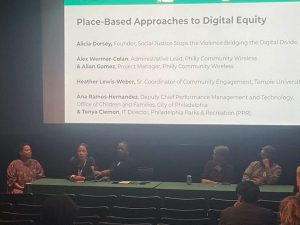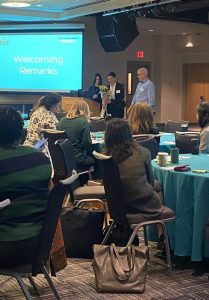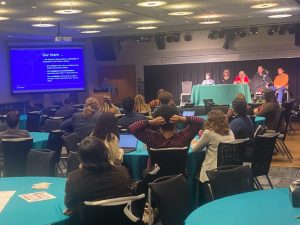By Brian Donoghue

As part of an action-packed Digital Inclusion week in Philadelphia, Next Century Cities had the privilege of partnering with the Technology Learning Collaborative as a sponsor for their annual conference. Newly-appointed Executive Director Kate Rivera and her team pulled together an incredible program of workshops and panels around the core theme, “This Is Our Moment: Moving the Needle On Digital Equity.”
Following introductory remarks, the first panel discussed local, state, and federal perspectives on broadband access and adoption, citing success in various approaches. The panel, moderated by Rivera, included:
- Juliet Fink-Yates, Digital Inclusion Manager for the City of Philadelphia;
- Erin Wachter, Deputy Director of the Pennsylvania Broadband Development Authority; and
- Nicole Ugarte, Pennsylvania’s Federal Program Officer for the National Telecommunications and Information Administration (NTIA).
The panelists covered a wide range of topics, including upcoming federal funding opportunities, accountability at different levels of government, and developing local and regional partnerships to ensure the long-term sustainability of digital equity progress. 
The rest of the morning, conference participants moved to breakout sessions focusing on topics including ‘Supporting Digital Access and Literacy For the Adult Learner’ and ‘Supporting English Language Learners in Digital Literacy Environments.’ During the lunch hour, the group reconvened to learn more about the Affordable Connectivity Program (ACP), including how the program works, who is eligible, and how to help sign people up.
Attendees heard first-hand accounts of supporting ACP enrollment from Cassandra Manotham, Digital Navigation Specialist at Southeast Asian Mutual Assistance Coalitions (SEAMAAC). SEAMAAC has over 2 decades of experience serving and advocating for refugees, immigrants, and asylees in the Greater Philadelphia area. Manotham’s work leverages the longstanding relationships of this trusted community partner to improve digital outcomes for residents. 
The breakout sessions for the afternoon included “Place-Based Approaches to Digital Equity,” “Don’t Forget Accessibility…” and “Older Adults and Digital Inclusion.” During the Place-Based session, a panel composed of City of Philadelphia leaders and community partners discussed Philadelphia’s successes and shared visions for future efforts that build on those wins. Tonya Clemon, IT Director, Philadelphia Parks & Recreation shared how her department’s Digital Equity Bridges program is working to ensure that every recreation center in the city has high-speed, reliable internet and equipment to allow all members of the community to take advantage of what technology has to offer. The nonprofit Philly Community Wireless shared how their work with North Philadelphia community gardens and public parks to develop holistic digital equity services catered to neighborhoods’ needs and goals.

Attendees worked in small groups during the conference’s closing session. They were asked to imagine what the future will look like to achieve digital equity goals in Philadelphia. Insights from this session were provided to the Pennsylvania Broadband Development Authority, which may also be used to develop the state’s digital equity plans.
A key aspect TLC’s conference highlighted was the strength of Philadelphia’s digital equity ecosystem. Local nonprofits, addressing the myriad of issues facing Philadelphia’s residents, are unified in their commitment to working to bridge digital divides in their community, whether their core mission is driving better outcomes for youth or seniors, immigrants, residents with disabilities, or returning residents. Strengthening the coordination capacity of TLC by appointing a phenomenal Executive Director and formalizing nonprofit status will ensure TLC’s leadership in this field for years to come.

